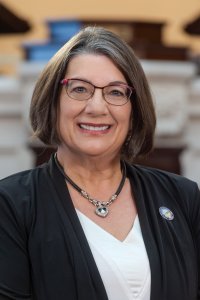By Susan Tebben
Ohio Capital Journal
Just before Thanksgiving this year, Logan resident Natalie Nutter filed for divorce from her husband, Kevin.
Weeks prior, Kevin Nutter, also of Logan, pleaded guilty to violating a protection order Natalie had filed against him, which she’d received after he’d made threats against her and her family. In exchange for his guilty plea, Kevin Nutter received a $25 fine and one year of non-reporting probation. A no-contact order was also in effect, according to court records.
The Hocking County Sheriff’s Office is still investigating the incident.
It is this type of incident that state legislators are trying to prevent with the proposed changes to domestic violence law that would empower law enforcement to legally remove guns from the hands of those convicted of domestic violence offenses.
State Sens. Stephanie Kunze, R-Hilliard, and Nickie Antonio, D-Lakewood, have introduced Senate Bill 43, which would prohibit a person convicted of domestic violence or assault of a family member from owning a firearm, and create an established procedure to relinquish firearms, especially in the case of a protection order.
The bill would also require all open domestic violence warrants to be added to the law enforcement tracking system LEADS (Law Enforcement Automated Data System), which is not always happening.

“What’s happening is that the police in different jurisdictions don’t know if there’s been a warrant specific to domestic violence,” Antonio said. “So, it would really help law enforcement, give them another tool.”
Law enforcement officials agree that there are inconsistencies in the enforcement level, particularly when it comes to domestic violence.
In a hearing on a different bill, Preble County Sheriff Mike Simpson, who is also the director-at-large of the Buckeye State Sheriff’s Association Board of Directors, was asked why crimes weren’t being entered into the system consistently. He said protocols for entering the data are made locally and “could be done 88 different ways.”
“We did find domestic violence (crimes had not been entered),” Simpson said. “And based on not entering those, we could find someone in a neighboring county, and I don’t know he has a warrant… it’s a public safety issue.”
The firearms element tends to be a sticking point, Antonio said, and makes moving forward with these types of measures difficult.
“I have continued to introduce this kind of legislation because I think it’s really important to discuss,” she said. “Usually when we get to the point of relinquishment of a gun, the conversation sort of shuts down and people shut down.”
Sarah Wolf-Knight, the grants and advocacy manager for the YWCA of Dayton, thinks SB 43 addresses a loophole in the law that the organization and other advocates have tried to remove on a local and federal level.
“There just isn’t the enforcement that’s needed,” Wolf-Knight said. “Anecdotally, we’ve seen that they kind of get read a paragraph that says, ‘hey, you’re not allowed to possess a firearm,’ and that’s all they can do. It’s not enough.”
Attorney and legislative policy consultant Tracy Grinstead-Everly has seen similar measures pass in states such as Texas, and recent incidents like the Kirkersville shooting show the need for a spotlight on firearms and domestic violence.
“It’s not a private matter; it happens in the schools, it happens at the workplace,” Grinstead-Everly said. “By not enforcing the law, the message you’re sending to survivors is that they’re not important.”
Kunze and Antonio have introduced separate versions of this bill in previous general assemblies, but they haven’t seen any movement so far. The current bill hasn’t seen a hearing since April in the Government Oversight and Reform Committee to which it’s assigned.
“There does not seem to be a lot of political will for a majority of legislators to move the bill forward,” Antonio said.
